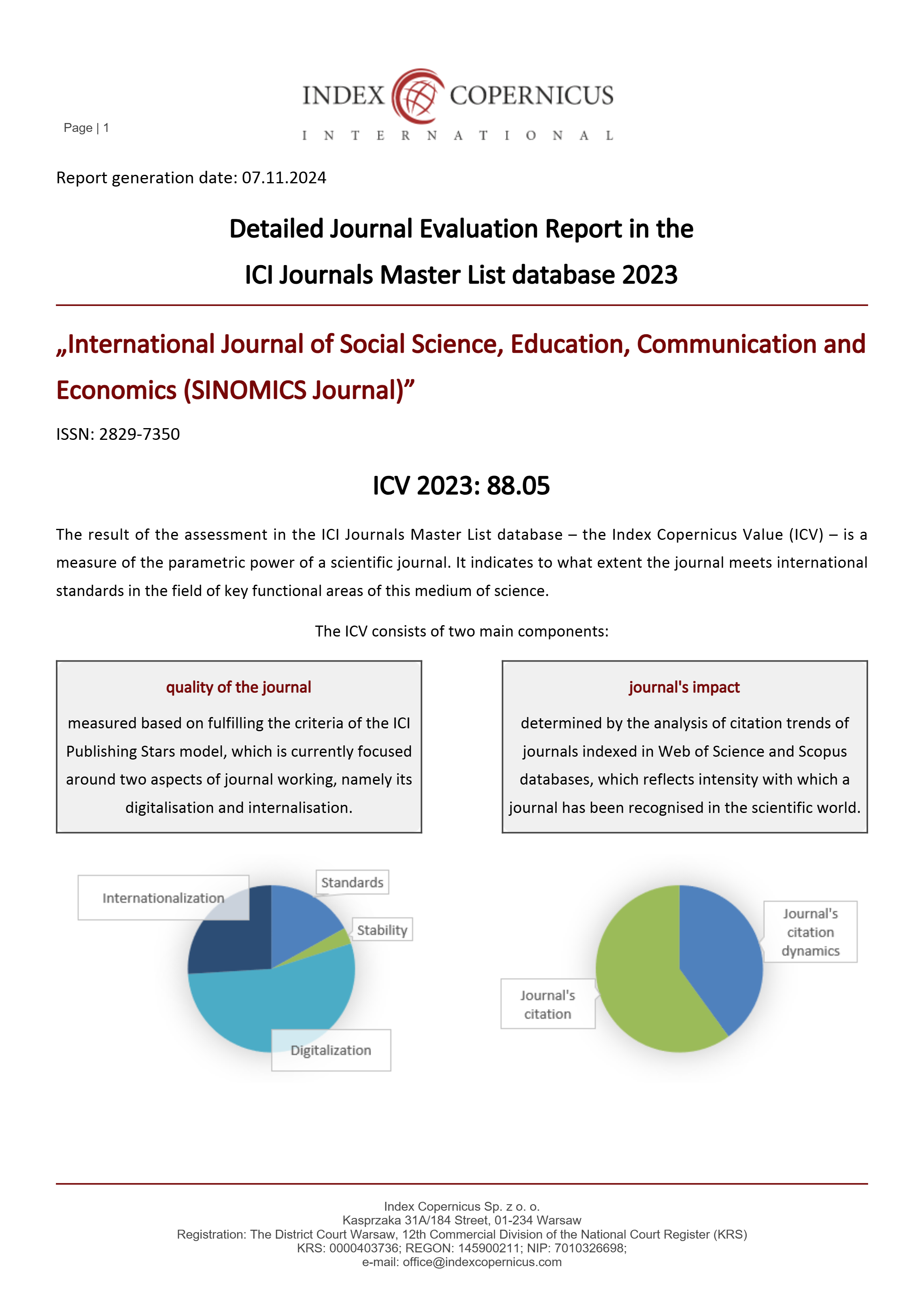An Analysis of Tourism Facilities and Services Influencing Tourist Satisfaction in Indonesia Tourism
Main Article Content
Yori Griselda Salsabila
This research reflects the level of satisfaction among customers within Indonesia's tourism sector, especially in Bali, a globally renowned island destination. Key elements affecting the satisfaction of tourists in Indonesia include tourism facilities, tourist information, and tourism infrastructure. The aim of this research is to recognize and gather empirical evidence to draw conclusions regarding the satisfaction of foreign tourists. The research method is a descriptive quantitative approach with a sample size of 250 individuals. Data is collected through observation and a questionnaire survey. Analysis involves multiple linear regression analysis, hypothesis testing, and the determination coefficient method using SPSS 26. The findings indicate that tourism facilities, tourist information, and tourism infrastructure collectively contribute to a 90.4% influence on the satisfaction of foreign tourists. A segment of the research shows tourism facilities have no influence on tourist satisfaction and the significant positive influence of tourist information and tourism infrastructure on tourist satisfaction. Hence, it is essential to enhance and maintain these facilities.
Anissa, D.W. (2019). Infrastructure Plays an Important Role for Tourism Progress. Jakarta: Kompas.
Chavan, R. R., & Bhola, S. S. (2014). Worldwide Tourism: A Review. Indian Journal of Marketing, 44(3): 24–34.
Dyike, A., Supriadi, D. & Barokat, U. (2017). “Analysis of Determinants the Foreign Exchange Earnings of Tourism Sector in Indonesia”, Journal of Accounting, Vol.19 No. 1, pp.34-43.
Ekananda, Mahyus (2014). International Economics. Jakarta: Erlangga.
Fuchs, M & Weiermair, K. (2003). New Perspectives of Satisfaction Research in Tourism Destinations. Tourism Review. 58, (3), 6 – 14.
Getz, D., & Page, S. J. (2016). “Progress and Prospects for Event Tourism Research”, Journal of Tourism Management, Vol.52, pp.593-631.
Ghazali, Imam. Applications of Multivariate Analysis with IBM SPSS 23 Program, Eighth Print. Semarang: Diponegoro University, 2016.
Hady, Hamdi (2020). International Economics: Trade Theory and International Policy. Jakarta: Ghalia.
Kandampully, J. (2000). The Impact of Demand Fluctuation on the Quality of Service: A Tourism Industry
Example. Managing Service Quality, 10, (1), 10-18.
Kodhyat H., (1998). History of Pariwisata and Its Development in Indonesia. Jakarta: Grazing.
Laila, W. N. (2018). "Factors Influencing Tourist Satisfaction in Berastagi", University of North Sumatra, Medan.
Melia Putri., (2017). “Tourist Satisfaction at Cultural Destination (A Case Study of Saung Angklung Udjo Bandung, West Java, Indonesia”, International Journal of Tourism & Hospitality, Vol. 4 No. 1, pp 35-43.
Moerwanto AS, Junoasmono T., (2017). Integrated Tourism Infrastructure Development Strategy, Vol. 3 No 2.
Oliver, Richard L, (1997), Satisfaction A Behavioral Perspective on the Consumer. McGraw Hill Education, Singapore.
Parasuraman, A., Zeithaml, V. & Berry, L. (1985). A Conceptual Model of Service Quality and Its Implications for Future Research. Journal of Marketing, 49, 41–50.
Petrick, J. F. (2004). “The Roles of Quality, Value, and Satisfaction in Predicting Cruise Passengers’ Behavioural Intentions”, Journal of Travel Research, 42(4): 397-407.
Spillane, J.J. (1994). Indonesian Tourism: Economic Strategy and Cultural Engineering. Volume 5. Jakarta: Kanisius.
Sugiyarto, G., Blake, A., & Sinclair, M. T. (2003). Tourism and Globalization. Annals of Tourism Research, 30(3); 683-701.
Syamsu, Yoharman (2000). Characteristics of Foreign Tourists in Indonesia, Jakarta: STP Trisakti, Vol.52 Edition.
Wonderful Indonesia (2019). “Study on the Impact of the Tourism Sector on the Indonesian Economy”, Tourism and Creative Economy Agency, Republic of Indonesia.
Zeithaml, V. (1988). Consumer Perception of Price, Quality and Value: A Means End Model and Synthesis of Evidence. Journal of Marketing, 52, 2-22.










